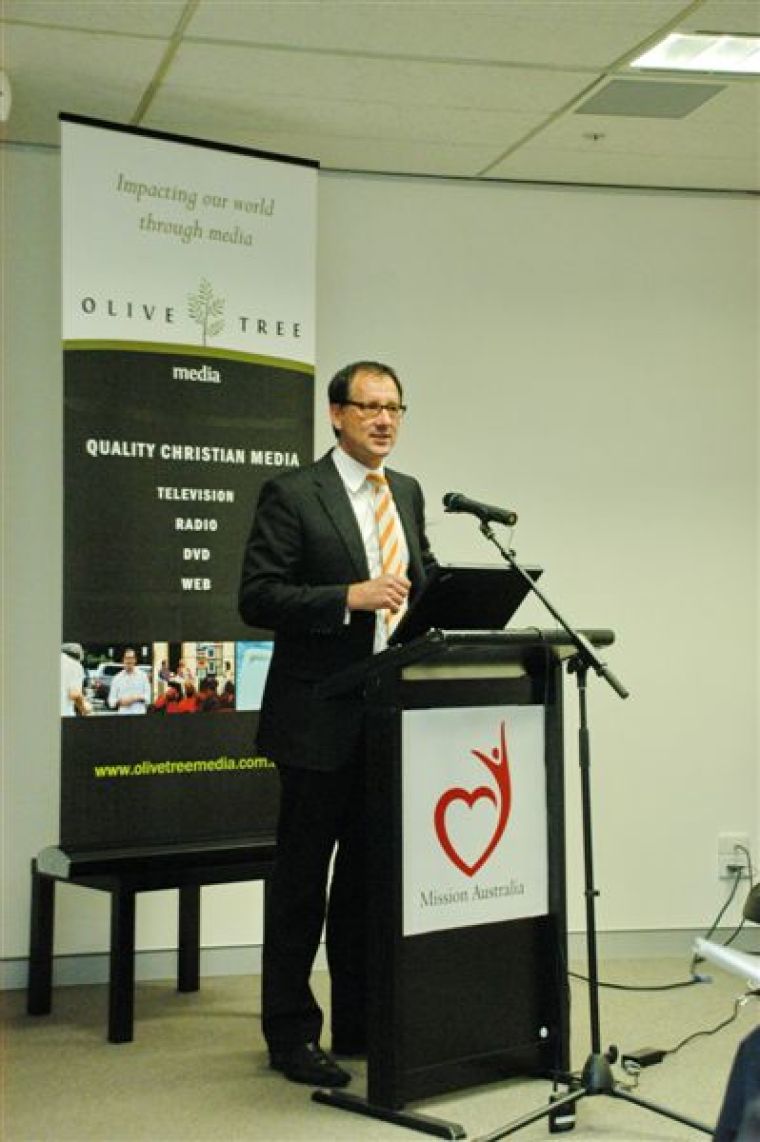
Olive Tree Media produces a range of Christian media resources including television series, daily radio spots, e-mail devotions and devotional books.
"We decided a few months ago that we wanted to address some of the 'blocker' issues that stop people in the Australian community from coming to faith," said Olive Tree Media's CEO, Karl Faase. "Whilst there are many guesses about what these might be, we realised we didn't actually know," he said. "Once we discovered these 'blockers', we plan to produce a television series that addresses them," said Karl.
Olive Tree Media commissioned McCrindle Research to carry out the research.
The research revealed the top ten barriers to Christian faith as being: Church abuse, hypocrisy, judging others, religious wars, suffering, issues around money, church being outdated, hell and condemnation, homosexuality and exclusivity.
"The survey was completed by 1,094 Australians from a national representative sample," said Mark McCrindle from McCrindle Research. "This was followed up with three focus groups made up of non-Christians. We had a group in their twenties, Generation Y; those who were starting families, Generation X and then baby-boomers," said Mark.
"We started with the national census data which reveals that three out of five Australians tick the Christianity box," Mark said. "However when we added the option of Spirituality to that question, the figure dropped to forty percent," he said. "Drilling down even further we discovered that only eight percent indicated that they were involved in practicing their religion or worshipped as part of a group."
The survey asked people to identify who influenced them the most when it came to religious belief with the dominant answers being parents and family, followed by mass media, social media and the internet.
"When we asked what impact high profile atheists such as Richard Dawkins and Christopher Hitchens had on people's beliefs, we were surprised to discover that three out of four said they had had no impact at all," Mark said.
Fifty-one percent of those surveyed said they were not open to exploring or investigating other religious views and practices, however 41 percent were 'somewhat' or 'slightly' open.
A key reason for the research was to discover the 'blocker issues' that stopped people from considering Christian faith. These varied in order, depending on the background of the group being surveyed, but a common key blocker was the church's stance on homosexuality, with 29 percent of Australians saying that this completely blocked them in engaging with Christianity.
The concept of hell and condemnation was another key blocker with 25 percent stating that the idea of a loving God who allowed people to go to hell, stopped them from engaging with Christianity.
When it came to Christians, the church and Christianity, the key issue Australians had were church scandals and reports of abuse, with 55 percent indicating that these issues had a massive negative influence on their perceptions.
One interesting result was how Australians viewed celebrity endorsement of Christianity. "The biggest turns-offs were public figures or celebrities discussing their faith," Mark said. "Whilst these methods are used in the United States, Australians are seemingly distrustful of the motives behind public declaration of religious beliefs," he said.
The list of the top ten blockers also includes hypocrisy, judging others, religious wars, suffering, issues around money and exclusivity. Full details together with background information are available on the Olive Tree Media web site. (www.OliveTreeMedia.com.au)
In launching the report, Dr Peter Jensen, the Anglican Archbishop of Sydney said he was encouraged by the survey's findings on the influence of families on a person's Christian values. "The transmission of faith through families is tremendously significant," he said. "When I was principal of Moore College and I asked an incoming student how they came to faith, families were very significant."
Archbishop Jensen added that the survey showed that the influence of friends was also very important. "Sixty percent of Australians don't know a Christian," he said.
Following the release of the survey, Karl Faase said that there were a number of steps that Olive Tree Media wanted to see as outcomes.
"The next thing is to continue the conversation, to get people to talk about what is blocking people from Christian faith and how we interact with our community for the Gospel," he said. "We need to keep in mind that this is not 'faith by focus group', where we find out what people want and give it to them. It's finding out what blocks people from hearing our message and being as clear as we can about what we do believe," Karl said."
"Then we will use the research to develop an Apologetics Series for television, DVD, web and radio. We plan on a 10 part series that looks at each of the top ten 'blocker issues' and gives an accessible response so that the average Australian can engage with the material and make an informed belief and lifestyle choice," Karl said.
Details of the plans for the series and more information on the survey are available from the Olive Tree Media web site. (www.OliveTreeMedia.com.au)